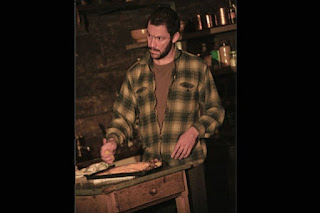'The River' review or 'Still waters run deep?'
'The
River', Jez Butterworth
The
Royal Court Theatre, Friday 26th
October
With
'The River', it's as if Jez Butterworth has taken all the anarchic
energy of 'Jerusalem', bundled it into a corner and starved it of
oxygen. Everything that was exhilarating and energizing in
'Jerusalem' has become cold, still and ugly. This dark energy –
call it the cruel side of the countryside or the wilder side of human
nature – is only released occasionally in 'The River'. When it does
wriggle free it's horribly unsettling; like a chilling wind that will
not pass.
We
begin in a cozy log cabin, where Dominic West's 'Man' is holed up
with Miranda Raison's 'Woman'. The atmosphere feels odd but that's
mainly down to a strange lack of chemistry. It's as if these two
lovers have just had sex in a fridge. But then an ensnaring Ted
Hughes poem is thrown into the mix and things heat up. The Man gets
excited – not by the beautiful woman in front of him but by nature.
He extols the virtues of midnight trout fishing and his unlikely
enthusiasm casts a spell over us all.
Things
start to go wrong. People disappear and others reappear in their
place. It gets hard to trust anyone or anything (time becomes
elastic) and the play wriggles around in the strangest of ways; like
a fish in our hands, struggling to get free. The Man and his Woman
become trapped in a twisted cycle, as something ugly - perhaps
prompted by that wild location or perhaps simply dormant in us all –
begins to take over this romantic retreat. The skewed chronology
means we know something bad is coming but not when. We wait for that
ugly, hidden energy to make itself known. Ian Rickson does well to
hold onto this anticipation, keeping as tight a lid on the play's
dark energy as he dare.
This
cruel anticipation is the play's strongest point. In fact, the
atmosphere feels far more powerful than characters ensnared by it.
West does well to hold onto the ambiguity of his character but his
performance is, by necessity, a forced one. Butterworth's dialogue,
with its self-conscious phrasing ('this chapel of cloud passed over
my head'), sounds odd. This might be a man with secrets but even a
character's lies need to ring true. A whole play of such false notes
is tough to take. It feels like the characters are there to bolster
the atmosphere; a strange and dishonest dramatic hierarchy.
Yet
there's still an uneasy force festering here. There's a cracking
moment when West expertly guts and cooks a fish for dinner. It's
easily the most expressive scene and it is a silent one. To the
strains of soothing classical music, West guts a real fish and pulls
out its insides. The fish looks so silver and shiny and gorgeous –
but inside it's a gory mess. A creeping feeling builds that perhaps
something might - or should - fight back for that powerless fish;
that perhaps nature will seek its revenge or find its release by
creeping into the darkest parts of our souls and making animals out
of every one of us.



Comments
Post a Comment